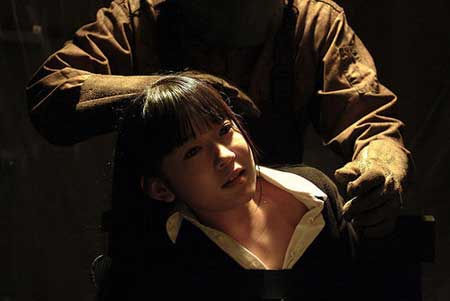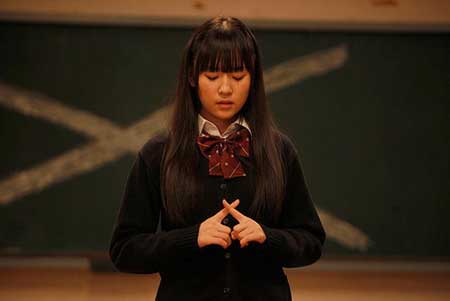SYNOPSIS:
A man in the name of Hideaki and his 6th grade classmates, Takeshi, Chie and Tetsuya, wake up to find themselves in their old elementary school after the suicide of their teacher. There they play a game called x game. X game was created by a classmate which was used to bully a girl named Mariko. In order to survive they must play the game until the final level, level 13 the Death Penalty.
REVIEW:
If you’ve heard of this film at all then no doubt you’ll be aware of its apparent debt to the Saw series. There can be little doubt that this film is in part inspired by the rash of ‘torture p*rn’ films that followed in Saw’s wake—Hostel and the like—but thankfully there is more to it than the usual wafer-thin plot and lashings of gore. This is a more intelligent and interesting film than its predecessors, often genuinely frightening rather than merely disgusting.
The basic idea is nothing new. A motley crew of young people are abducted and imprisoned in an abandoned school, where they are to be subjected to hellish tortures and humiliations for transgressions they committed as children. The opening scene makes for a good, concise statement of intent. We have a near-hysterical teacher with a horrific facial injury, locked in a classroom full of faceless mannequins, being forced by unseen tormentors to put his hand into a sinister-looking ‘lucky dip’ box. He draws out a ticket inscribed with the words ‘death penalty’. The next we see of him, he is leaping to his death from the roof of a high building.
There is something of a preamble to establish the two main characters before the ‘torture game’ conceit of the film gets underway. The goofy protagonist Hideaki (Hirofumi Araki) is just the sort of antihero that East Asian cinema does so well; awkward, clownish, a little cowardly and entirely disarming. A Shaggy rather than a Freddie, and thus so much easier to root for. The female lead Chie (Haruka Nakagawa) is your standard, super-sweet Japanese ingénue. These two are thrown in with two other victims—wiseguy Takeshi and sadist Tetsuya—for having bullied an unpopular girl when they were all in grade school. This girl—the self-acknowledged Sadako clone, Mariko—is the architect of all their misery that is yet to come.
What sets X Game apart from its questionable influences is the fact that it engages with childhood bullying as its theme and the source of its horror, in much the same way that Let The Right One In did. While it is in part both a revenge fantasy and a staged snuff film, its central themes are of cruelty and persecution, responsibility and culpability. At least three of the ‘victims’ appear to be under indictment for omission of action, for failing to step in against the bullies, like the proverbial ‘good German’ of the Third Reich.
The film seems uncomfortably topical now, with the recent alarming increase in the frequency of school shootings. While this revenge fantasy is much more stylized and elaborate than those that are now acted out in the real world with depressing regularity, the core idea is the same. X Game does well not to demonize the demon, and the blame game penalizes everyone who plays. The character arc of Chie is particularly rewarding in this regard, and she dramatically belies her seeming generic sweetness as the film goes on.
The characterization is slightly shallow, but it also very realistic in terms of how people tend to act under pressure. The cute people do not rise above and prove themselves to be better than the glowering bad guys. There are no heroes, no martyrs, no Tiny ‘Zeus’ Lister selflessly throwing a bomb detonator out of a boat to prove the Joker wrong. This is human nature, red in tooth and claw. When the going gets tough, everybody reverts to type.
The second act does take something of a nosedive. It stops being clever and becomes simply trashy and sadistic, perhaps relishing its subject matter a bit too much, but the third act of the film pulls it back a little. Unfortunately the execution does not quite match up to the grandeur of some of the ideas, and a lot of the narrative ideas seem a little undercooked. There is still plenty to like, however, and the good points outweigh the bad enough to make it worth checking out. X Game is a frankly derivative film that nevertheless manages to remain interesting by squeezing the last few drops of blood out of its seemingly spent sub genre, which is no mean feat in itself.
X Game (2010)
 Horror News | HNN Official Site | Horror Movies,Trailers, Reviews
Horror News | HNN Official Site | Horror Movies,Trailers, Reviews











